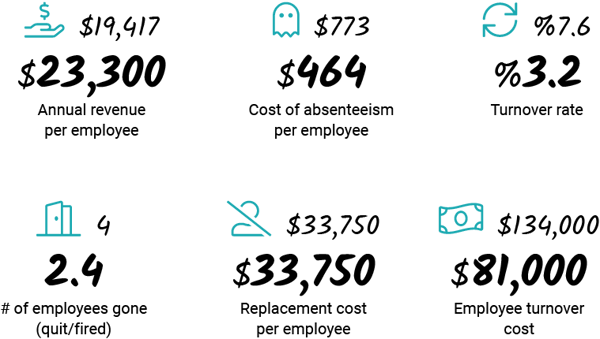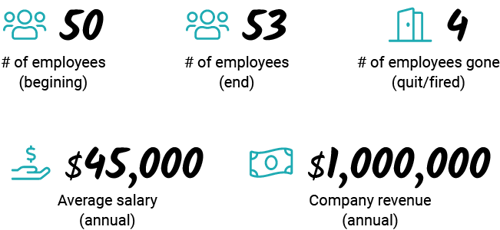Organizational psychologists have described employee engagement as "The ability to capture the heads, hearts, and souls of your employees to instill an intrinsic desire and passion for excellence."
Organizations are aware of the importance of employee engagement. But given the abstract nature of the concept, in many organizations, improving employee engagement often takes a backseat. Moreover, data-focused executives may find it challenging to grasp the importance of this "touchy-feely" subject.
And, ultimately, the question "What would be my return on my investment," may appear difficult to answer with precision. The result, executives may relegate engagement initiatives to the bottom of the priority list.
Sound familiar?
The Reality
Employee engagement isn't just some abstract HR concept; it has a very tangible productivity connection.
Official statistics prove this, time and time again.
Looking at successful companies with admirable achievements such as a high retention rate, low absenteeism, high productivity and profits, what do you think is the common denominator running through these businesses? That's right—a high rate of engaged employees.
By comparing these successful companies to their less successful counterparts, we can begin to quantify the precise degree in which employee engagement impacts a company's success.

What Can Businesses Expect When Investing in Employee Engagement
In order to calculate ROI (return on investment) of employee engagement, let’s look at some validated statistics to inform our calculations.
- High employee engagement has been shown to experience a 21% increase in productivity, according to research by Gallup.
- Businesses saw a drop in absenteeism by 41%—that’s employees using unearned PTOs—when employees were engaged in their work, according to a Gallup Workplace Report.
- According to a Gallup report, on average, highly engaged teams experience a 43% decrease in voluntary turnover.
Using engagement statistics provided by the HR industry, we can deduce a fairly accurate estimation of how much revenue an organization can expect to save by implementing an Employee Engagement Program.
Let’s begin with an easy and simplified example; drawing up some basic values for a fictional small business we will creatively call, “Company X.”
Company X over a 1 year period:
Current Cost Metrics VS with Higher Engagement:

As you can see, when taking into consideration the employee engagement statistics above and applying them to the basic values of our fictional business, we can quickly see the profound impact of employee engagement on Company X.
With an Employee Engagement plan this small business can reap the benefits of:
- Higher revenue
- Lower cost of absenteeism
- Lower employee turnover rate
- Lower turnover costs
Total ROI of an Employee Engagement Program
The total ROI is the amount of revenue saved due to a 20% increase in employee productivity, plus the money saved from a 41% reduction in absenteeism and a 40% decrease in turnover:

The results are clear: Implementing an Employee Engagement Program can yield up to $235,000 of additional earnings per year in the pockets of our fictional company. Granted, these percentage increases are based on a best-case-scenarios, but even when averaged out at half, a revenue increase of 117,500$ per year is significant for a small business like Company X.
 With a suggested 1% of its salary mass investment in its employee engagement program, the net return is as follows:
With a suggested 1% of its salary mass investment in its employee engagement program, the net return is as follows:
Annual Salary Mass: $2,385,000
1% Engagement Program Investment: $23,850
Average revenue increase: $117,500
Net Return on Investment: $93,650
For every $1 Company X invests in its Employee Engagement Program, it yields a $4 return on investment!

Save money with an Employee Engagement Program!
Find out how much: Employee Engagement ROI Calculator
Final Thoughts
Research and data analytics shows that engaged employees lead to more profitable businesses.
This is a notion most of us feel intuitively, but now, there are official statistics and extensive data to support what we all assume. Employee engagement may not be as “touchy-feely” of a subject, after all.
Moreover, with more companies implementing Human Capital Management Software, measuring the ROI of an Employee Engagement Program is becoming easier. In short, implementing an employee engagement software like Applauz yielded a 4X return on investment for Company X.
With such significant returns, investing in employee engagement should be at the top of every company's priorities and never drop to the bottom of the to-do list.



